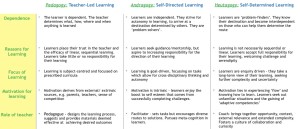In my new book, OPEN, I speculate on the shift in learner motivations and dependencies brought about by the revolution in how we learn socially. I argue that places where formal learning happens (in education and the workplace) have to adjust to the new reality. here’s the relevant quote:
“There must be some unwritten academic maxim somewhere that if you want to dissuade people from attempting to understand how learning works, you give them the worst names you can think of. I will attempt to explain this in simple language, but let’s start with a technical announcement:Though it was happening anyway, Open has accelerated the shift from pedagogy, to andragogy, to heutagogy.
There, aren’t you glad I told you that? Notwithstanding the fact that I managed to combine the three ugliest words in the English language in a single sentence, I like to think there’s quite a profound thought in there. The word pedagogy derives from Greek and, literally translated, means ‘to lead the child’; andragogy is translated as ‘to lead the man (adult)’; heutagogy means ‘to lead to find’. I know, that’s not much clearer. But, if we look at commonly-used interpretations, it gets better.
In pedagogy, the learner is led to a conclusion determined by the teacher, informed by the teacher’s knowledge and beliefs – it could be termed ‘instructional learning’. In andragogy, though the destination may be decided by the tutor, the route involves greater learner involvement, acknowledging the importance of relevance, motivation and problem-solving. Although andragogy is a term open to many interpretations, let’s use it here to denote ‘self-directed learning. In heutagogy, there is not necessarily a defined destination, nor a prescribed route – it is ‘self-determined learning’.
These shifts in how we’re learning mirror the bigger shifts in how we’re living. We are moving from being compliant citizens, being told what is good for us, to informed actors who are determining our own futures. As society inevitably becomes more open, the way we learn in the future simply has to reflect those shifts. Changes in learning are both a reflection, and a consequence, of how we now want to live. The shift, from instruction to self-determination, is also happening because that’s the path we’ve been taking when we learn informally.”
Of course, I’m not suggesting that kindergarden students should be dictating what’s to be learned – this is a journey from dependence to self-sufficiency, and it can take a lifetime to realise. But when learners like Jack Andraka reach that point of self-determination by the time they’re fifteen, we have to accept that things are changing fast:
After the book came out, a number of people asked how to help learners move along the continuum from tutor-led to self-determination. The first step is identifying the characteristics of each stage, so I’m grateful for Jon Andrews at St Paul’s School in Brisbane, for having a first draft at a matrix, which I then built upon, and share here (you’ll need to click on the image to enlarge it):
I’m no longer working in the classroom, so I need leaders of learning to suggest strategies that will help nudge learners along. I’m sure however, of one thing: the days of keeping learners dependent on tutors are over. The UK’s Sutton Trust has been putting together a research ‘toolkit’ of strategic interventions, based upon cost and impact. The three most effective strategies are feedback, meta cognition & self regulation, and peer tutoring. So, it appears that the shifts we’re witnessing in social learning are happening for a very good reason.
What strategies do you adopt to make learners more self-determined?



A lot of stuff I find it easy to agree with. I tend to think people that use over complex and obscure vocabulary to explain relatively easy to grasp concepts have some sort of inferiority complex which makes them believe they can sound cleverer than they really are. We know that many people written off at school do very well later. Motivation is probably more important then anything else. Those people intrinsically motivated by academic learning do well in school because this is the dominating valued context. Motivation changes with context and the context is changing with technology and social changes. For me the endless debates over knowldge, skills and process are largely missing the point.
Ha ha! You would.
I completely agree that pedagogy is not enough but have come to quite different conclusions about why: endless debates over how to teach and motivate students are largely missing the point. The context you discuss is not changing nearly so quickly as techno-enthusiasts would have us believe. The dominant context is still underpinned by the quality of what you know. For me, pedagogy is not enough because it encourages us to focus far too much on HOW and takes little account of WHAT we teach. Motivation is a blind alley: motivated to do what exactly? The only motivation that counts is the motivation to do what you don’t want to do. And while there are rare individuals who are predisposed to delay gratification and do what needs to be done in order to be successful, the rest of us benefit from expert teachers.
The contexts are already varied, they don’t even have to change. Its here right now. This is no different from debates we were having in the 70s, 80s, 90s 00s etc. Its not about technology per se its just one factor. I agree it is about knowledge and knowledge is contextualised. We have been trying to beat knowledge into children for decades with varying degrees of success. I fundamentally disagree that motivation is a blind alley. People don’t do anything without motivation. Expert teachers generally know how to motivate – some with sanctions some with rewards some with a combination. Expert teachers are not just about subject knowledge or even pedagogical knowledge. We all know plenty of those with that in abundance that couldn’t teach to save their lives. You might be one of the fortunate few that can command motivation without thinking about it too much, many are not as fortunate.
David/Ian:
Interesting points and thanks for commenting. Re motivation: I’m on Ian’s side on this one. As Ken Robinson has frequently said ‘you can’t make anyone learn anything. I went to a school where we were forced to study Latin. The teacher’s preferred motivation was a thick leather strap. I cannot remember a single thing I learned in those Latin classes. Is motivation a blind alley for sportspeople? I think not (admittedly, I’m biased being a Sunderland supporter) I started learning to play golf 3 decades ago. I’m still learning, because I love the game.
Re knowledge: I think the context is changing everywhere. The economic value of knowledge is worth precious little – it’s the application of that knowledge that has value. That’s true in almost every aspect of the so-called ‘knowledge economy’. Yet we still have school systems that value being able to memorise elements of the periodic table, rather than developing skills.
I was reminded of the speed of the changing context just a few months ago. I played golf in India with an 8 year-old boy who taught himself how to swing a golf club entirely by watching YouTube videos of Tiger Woods. Despite coming from a rural village in India, he’s now world champion for his age-group. Could that have happened 10 years ago?
I think where David is right is that there is still fundamental knowledge needed to underpin use of knowledge but it soon gets complicated as to what is vital, what is nice to have and what is redundant. I’m a scientist by background but I wrote applications for specialist schools status in every subject area. I used the internet to do it and learnt quite a bit in the process but that in itself requires some specific knowledge to know how to do it. I learnt how to get a new exam board set up and accredited by Ofqual. there is no course of teaching to do that. Pretty well all the computing I know has not been formally taught. Sure I had some background knowledge but most of that was not acquired by formal teaching either. This is why I’m not against knowledge acquisition, its important but other things are as well and that is where I think I part company with David. At least that what it seems but that could be the communication medium. These things are better discussed face to face over a pint of Guinness, methinks.
You can learn to delay gratification. Follow up work on that initial research with the little kids has shown that like so much its a skill that can be acquired. People who can delay gratification employ techniques.
The impact of this and indeed your whole book is all-absorbing and at the same time completely exciting. I am most interested in the possibilities it allows for High School teaching BUT moreover, how those impacts can be made realities on a daily basis in the current average UK music room. I am still working on this!!
Thank you David. I love reading posts that ignite my thinking and teach me something new. The survival of educational institutions depends on educators adopting strategies that promote heutagogical learning. Such a timely and interesting post – thanks again for sharing your perspective on this topic.
Should educational institutions survive? Why is it an unchallenged assumption that they are the best and only possible purveyors of learning.
Self-determination implies choice. Heutagogically I choose to mostly avoid the institutions because they stultify. I may dip and sip but the bad taste of the standard offerings soon sees me off.
Those institutions need to give up on their monopolistic mindset and adopt adaptability.
I agree that students who are motivated and interested in their learning are looking for more control, unfortunately in many of my classes I have a fair proportion of students who have checked out of their learning, for a number of reasons not worth going into here. My question is how to accommodate the students who have checked out, with the students who want to drive their own learning, all in a Nationally driven curriculum dictated to us.
Thank you very much. I get your approach very important for teachers to prepare themselves for effective teaching. I am a university lecturer in pedagogy. Presently I am training university teachers on how to teach, especially the newly recruited teachers before they begin to teach. Always I am in need of means by which I can advance my knowledge and skills on how to help these teachers. So, your idea is so great for me and even I need short term training from western universities to build my experience if possible. Because they have rich experiences on theories of learning and methods of teaching for many years than any part of the world.
God bless you!
From Dulo